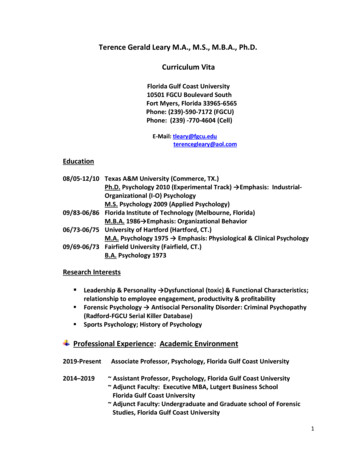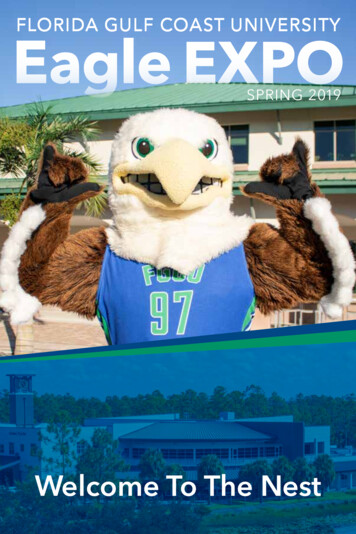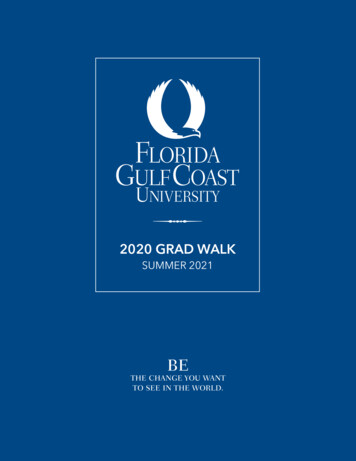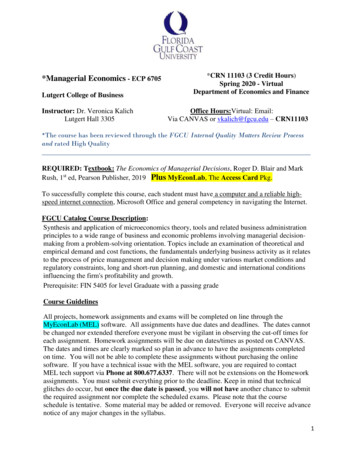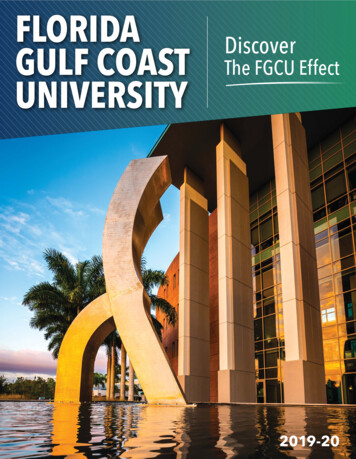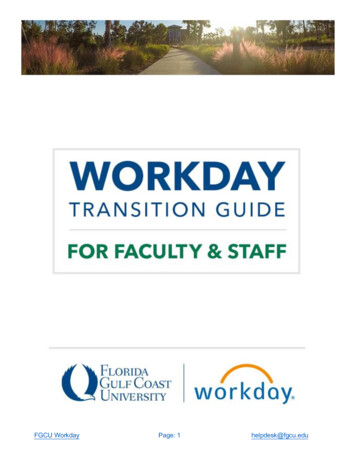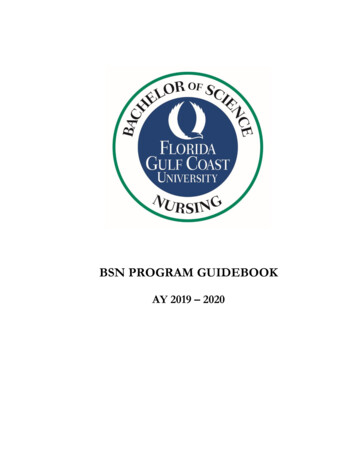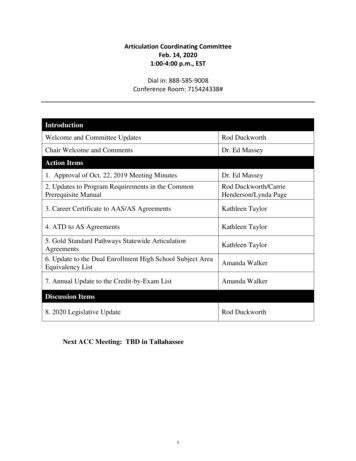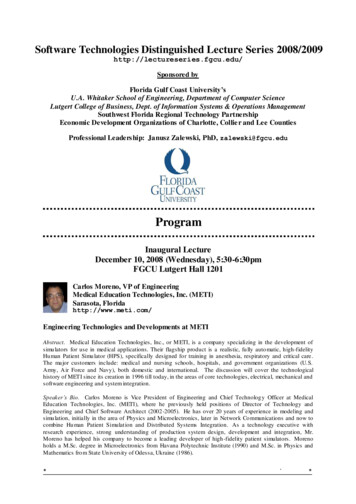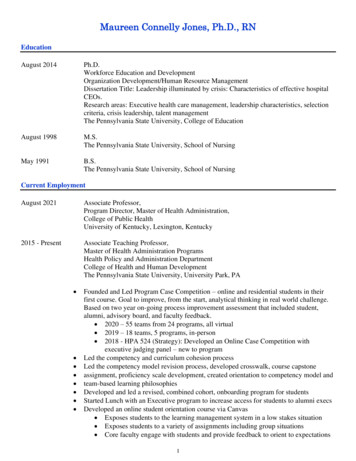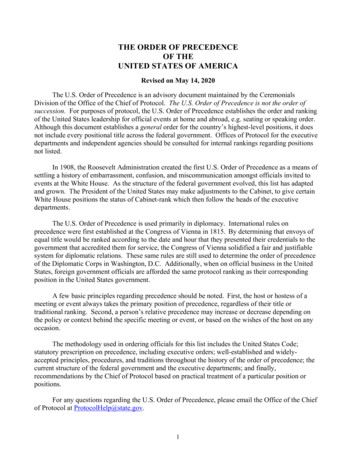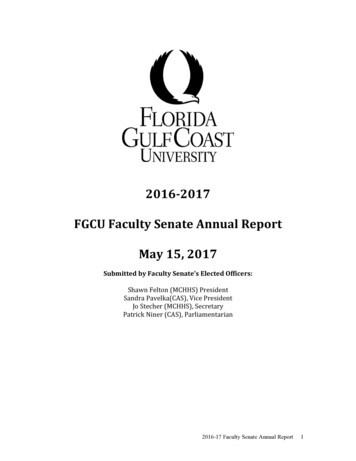
Transcription
2016-2017FGCU Faculty Senate Annual ReportMay 15, 2017Submitted by Faculty Senate’s Elected Officers:Shawn Felton (MCHHS) PresidentSandra Pavelka(CAS), Vice PresidentJo Stecher (MCHHS), SecretaryPatrick Niner (CAS), Parliamentarian2016-17 Faculty Senate Annual Report1
IntroductionThe purpose of the Faculty Senate Report is to document the efforts, deliverableproducts, and achievements of the FGCU Faculty Senate during the 2016-17academic year. The Faculty Senate Report also provides context and reflection onthe effectiveness of the Faculty Senate Governance System in the shared governanceof Florida Gulf Coast University.BackgroundThe Florida Gulf Coast University Faculty Senate was created as “a system ofcollegial faculty self-governance that ensure[s] the rights of faculty are supportedand the responsibilities of faculty in fulfilling the mission of the university are met”The Faculty Senate Governance System comprises the Faculty Senate, the Senate’sElected Officers, all standing teams and committees, and the Senate LeadershipTeam (which is composed of facilitators from each standing team).As outlined in the Faculty Senate Governance Document, the “Faculty Senate is thedecision-making body for FGCU faculty governance. The standing teams makerecommendations to the Senate, which has final authority. The Senate may enactresolutions on any matter affecting the academic mission of the University, andspeaks for the faculty on matters of concern. It is the responsibility of the senatorsto communicate with and get feedback from the constituents in their unit. Themeans of communication [are] determined by the senate representatives in eachunit.“The Faculty Senate engages in collegial dialog with the President of the University,the Provost/Vice President for Academic Affairs and others in positions ofadministrative leadership in order to pursue and refine the mission of theUniversity. Collaborative and shared leadership among all university constituents iscritical to creating a campus environment conducive to advancing studentachievement. Fairness, mutual respect, continuous improvement, an informedfaculty, and collegial decision-making are the hallmarks of the governance structure.”Standing Teams and CommitteesStanding Teams: The Standing Teams of the Faculty Senate are responsible for directoversight of key areas of faculty responsibility and involvement. These includecurriculum, program review, grants and research activities, institutional and facultyaffairs, and other domains related to curriculum, instruction, and faculty governance.The composition and scope of team responsibilities are described in the FacultySenate Bylaws. Teams receive and/or identify agenda items from three primarysources: the team’s elected faculty membership, the Faculty Senate’s Elected Officers2016-17 Faculty Senate Annual Report2
(either acting as a relay for concerns from the faculty at large or conveying actionfrom the Faculty Senate), and ex-officio administrative members of the committee.Each Team documents its workload and progress on a Work Plan that tracks goals,action steps, timeline, membership responsibilities and the final status of oraccomplishments related to each goal. Appendix 1 compiles this year’s Work Plansfor standing teams and details the associated goals and results.Standing Committees: Additionally, standing committees of the Faculty Senateprovide peer review of competitive or selective grant, sabbatical, and excellenceawards administered through the Office of the Provost and Vice President forAcademic Affairs and/or implemented as part of Collective Bargaining Agreementbetween the Administration and the United Faculty of Florida-FGCU chapter.Leadership InitiativesIn addition to its regular business handled through Standing Teams and Committees,the Faculty Senate this year focused on several Leadership Initiatives coordinatedby the Faculty Senate’s Elected Officers. In addition to the Leadership Initiativesidentified, the Faculty Senate’s Elected Officers led efforts to continue to improvethe function and role of the Senate Leadership Team (SLT). Collectively, SLTmembers and the Faculty Senate’s Elected Officers worked to ensure SLT meetingswere meaningful and essentially represented a steering committee for SenateBusiness. Theses efforts were critical to the strategic direction of the Senate. Thedialogue and engagement contributed greatly to the Senate as a larger, moremeaningful body.1. Student Success InitiativeStudent Success initiatives and four-year graduation rates were underlyingthemes for the University in 2016-17. The Faculty Senate was extremelyinvolved in promoting Student Success that dated to the outset of the fall 2016semester when the Senate Leadership met with the Provost and several otherkey support areas of the University to discuss strategies to promote studentsuccess. From the preliminary discussions a University-wide Presidentialtaskforce was initiated. The Senate Leadership was well represented on thiscommittee by Senate Vice President Dr. Sandra Pavelka, chair of one of the threesub-committees. Throughout the 2016-17 Senate Session, VP Pavelkacontinuously updated and presented to the Senate progress on the report. Thisreport was concluded and presented to thee Board of Trustees in April 2017 andwas awaiting the beginning of President Martin’s tenure as the 4th President ofFGCU. Appendix # 22016-17 Faculty Senate Annual Report3
2. Participation in Selection of 4th University PresidentThe Senate was extremely engaged in the selection of the 4th President at FloridaGulf Coast University. This began with the announcement of the Search andScreen committee in the spring of 2016. With the beginning of the 2016-17Senate session, Senate leadership worked extensively with the Office of the VicePresident and Chief of Staff to schedule Search and Screen Chairman, Trustee, Dr.Ken Smith to attend regular Q & A session within the Senate meeting. Dr. Smithmade three visits directly to the Senate during the search process. Furthermore,faculty representative to the Search and Screen committee, Dr. Sharon Iserndeveloped a survey process to poll faculty on their opinions of the candidates asthe advanced during the search. Dr. Isern needs to be commended for herextensive work in ensuring the faculty voice was heard during this mostimportant search and screen process.3. General Education Minimum GradeThe General Education Council recommended a minimum grade for generaleducation classes. This was developed through the Faculty Senate’s GeneralEducation Council and was presented on two occasions to the Senate Afterdiscussion and debate, the final document with modifications was approved witha super majority vote and will go into effect for Fall 2017. This was anotherexample of the focus the Faculty Senate had on student successes in the 2016-17year.4. Internationalization Ad Hoc CommitteeAn initiative that that continued and made major progress on theInternationalization Ad Hoc Committee. This was under the direction of Dr.Michael McDonald. The idea of the ad hoc committee is to focus on enhancinginternalization opportunities for the faculty. Much of the foundational workbegan in 2016-17. The 2017-18 Faculty Senate will need to continue this workto ensure completion of the task unanimously supported by the Senate.5. Re-administration of the Survey of Faculty Perceptions of Chairs’ and Deans’Performance.This initiative continued from the original efforts that began in 2011-12 workingjointly with our partners in the administration to refine and implement a versionof a survey developed by the Faculty Senate’s Faculty Affairs Team and adoptedby the Senate in Spring 2011. This year’s re-administration of the surveycontributed to ongoing-shared governance and allowed faculty opportunities torespond to a survey about their perceptions of chairs’ and deans’. This year after2016-17 Faculty Senate Annual Report4
several years utilizing the same instrument, the Senate’s Faculty Affairs Teammade modifications before the survey was administered. These changesresulted in in a delay of administration but the survey was released andconducted before the end of the Spring 2017 semester. Results will be deliveredto the individual units in Fall 2017. The data collected, from the survey, werereviewed and utilized by the Provost, the Deans, and the Chairs as part of theannual review process and thereby provided important information with regardto professional performance and growth.As this initiative continues it will be important to monitor the time of the yearthat the survey is released to ensure the largest participation and to ensureresults are returned prior to the end of the Spring Semester. As indicated, therewas an unavoidable delay in administration due to the changes being proposedby the FAT. It will be imperative to develop a timeline that allows for earlierreporting is followed for 2017-18. Also, with the changes made to theinstrument, it will be important for the Senate Leadership ensure the type offeedback being solicited is still of value and examine what changes may need tobe considered.6. Employee Satisfaction SurveyAt the outset of the 2016-17 Senate session an initiative for the Senate and theelected officers was to incorporate an employee satisfaction survey. Asindicated, the Senate Leadership team and Administration discussed this butaction was not completed. With the change in Presidential Leadership, this willneed to be examined and be priority for the Senate Leadership in 2017-18Other Initiatives and EffortsThe Faculty Senate was forward thinking throughout the year and responsive whenneeded. To note the FGCU Faculty Senate was deeply engaged in Board of Trusteeactions. The level of engagement by the 2016-17 Senate was paramount in theactive process of Shared Governance of the University. The Senate has strongly reaffirmed its positions as the voice of the faculty. Furthermore the 2016-17 Senatepassed several motions and resolutions and engaged in several other initiatives.1. Led by a resolution presented to the 2014-15, and the 2015-16 Senate, the2016-17 FGCU Faculty Senate unanimously reaffirmed FGCU’ faculty positionon no concealed weapons on campus. The resolution passed by the Senatewas shared with the Advisory Council of Faculty Senates (ACFS) (StateFaculty Senate Council represented by two members from each SUSinstitution). The final resolution can be found in Appendix # 3. In addition tothe above action, the Senate was extremely responsive to other action within2016-17 Faculty Senate Annual Report5
the Florida State legislature this past year. For example, the Senate passed aresolution opposing legislation affecting curriculum. This final resolutioncan be found in Appendix # 42. Led by the Senate’s Institutional Affairs Team and in collaboration with theFGCU University Office of the Register, the Senate endorsed and completedthe 2020-2021 academic calendar. This continues to ensure that fouracademic calendars are developed and approved.3. As customary and good practice, The Faculty Senate approved a number ofbylaw changes to ensure the Senate continues to be responsive to theevolving needs of the University. Some highlights of the bylaw changes.4. The Faculty Senate’s Elected Officers once again provided letters from theSenate President documenting the service of each Senator, Senate Alternate,Team and Committee Facilitator, and members of the Senate Teams andCommittees and the Planning and Budget Council and committees, which hasbecome a customary practice over the past few years. Over 150 letters weredistributed. The Faculty Senate’s Elected Officers unwavering dedicatedadministrative support from Academic Affairs in the printing of letters.5. The Faculty Senate’s Appointments Team continued to strengthen therepresentation of faculty members on all university-wide committees. Theprocess has become widely respected by all constituents on campus and hasallowed improved representation on committees, which has also improvedshared governance. Furthermore, the Appointments committee furtherestablished itself with a dedicated working email address and further refinedthe working documents on appointments. .At item that the Senate and the Team may still want to consider as we moveforward is to continue to streamline the process and ensure when nomineesare not selected that formal communication is provided back to the nomineesto enhance the process and communication line.6. The Faculty Senate continued the use of Adobe Connect to recordpresentations and visitors to expand the transparency of the Senate. Thisallowed for a detailed transcript of actual events and video archives areavailable in the 2016-17 Senate archives. Links to the recordings can befound within the agenda items. This was extremely useful when specialguests visited Senate, especially Dr. Ken Smith with his periodic visits andupdates related to the Presidential Search. Finally, the senate sponsored or participated in several events:o Senate co-sponsored the annual promotion workshop with the Office2016-17 Faculty Senate Annual Report6
of the Provost and Vice President for Academic Affairs.o Senate hosted a Board of Trustee Member, Dr. Ken Smith on threeoccasions. This marked the third time in the history of FGCU thatanother member of the Board of Trustees met with Faculty Senate.The 2017-18 Senate is encouraged to continue to foster therelationship with the Florida Gulf Coast Board of Trustees, especiallywith the Senate elected leadership changes. The upcoming Senate isfurther encouraged to invite other members that are not in aleadership positions within the BOT.o Senate hosted other guest including Director of Government RelationsJennifer Goen, Chief of Police Chief Steven Moore, Dean ofUndergraduate Studies, Dr. Dawn Kirby.o The Staff Advisory Council (SAC) and the Senate continued tostrengthen the communication process between the two respectiveorganizations. Continuing this year two SAC members attended eachSenate meeting and was provided an opportunity to deliver a standingreport. In comparison, the Senate President attended each SACmeeting was provided the same courtesy of delivering a standingreport. These efforts enhanced collaboration and further fosteredShared Governance of FGCU.o Senators participated in a lunch meet and greet hosted by StudentGovernment.o The 2016-17 was extremely involved in equality for all faculty, staff,and students. This was demonstrated with the Senate’s passage of aresolution related to travel restrictions. The final document can befound in the Appendix # 5o Lastly working the University Librarians, the 2016-17 Senatedeveloped an open access archive guidelines that will assistdissemination of faculty’s scholarly productions.Ongoing Issues Carrying Forward1. Future Direction of Higher Education Ad hoc Committee:An initiative form two years ago was the Senate’s positions on onlineeducation and Performance Based Funding. The work of this committeehas and will continue to greatly inform what quality education looks likeat FGCU. It will be important for the 2016-17 Senate to remain engagedrelated to initiatives from the Board of Governors related to distance2016-17 Faculty Senate Annual Report7
education, specially the implementation Online Strategic Plan and thefaculty development resources being developed. Furthermore work atthe Florida’s Advisory Council of Senates related to Performance BasedFunding will need to be engaged in by the FGCU Faculty Senate.2. Review of Senate Teams/Committees/BylawsThis initiative began approximately three years ago through the work ofthe Senate Team Review Ad hoc team. Several recommendations wereidentified to strengthening the engagement and functioning of the Senate.With the University embarking on its 20th Anniversary, it is time for theSenate to carefully review these recommendations ensuring the currentstructure of the Senate is the most responsive and adequatelyrepresentative of our faculty. Furthermore a full review of the bylawsshould commence to identify where efficiencies could be made,3. Enhancing the role of the Senate Planning and Budget Advisory Committee(SPBAC) and General communication:The formation of the SPBAC five years ago has strengthened the facultygovernance structure especially connecting the PBC and its affiliatecommittees to the Senate in a more formal way. Development andcommunication of information has continued to improve. However,efforts are still needed to ensure representation is strengthened. Thiswill be an important area for the Senate to address at the outset of theacademic year with many new members appointed to the PBC and sixaffiliated committees.4. General representation and faculty’s ownership of shared governance:The 2017-18 Senate must continue to build on the positive direction ofprior Senate with the level of engagement that has been seen over thepast three years. Further ideas to enhance communication include butnot limited to:1. Continue with the expanded length of Senate Meetings from 9:30 –11:30 to 9:30 – 12:00.2. Expanding time for Caucus meetings at the end of Senate meetings.3. Senators from individual colleges developing regular ways tosolicit faculty input on potential items. I would caution faculty tomonitor these methods to ensure that the information beingsought is meaningful to decision making.2016-17 Faculty Senate Annual Report8
4. Continue to collaborate with all stakeholders including staff andstudents and further explore collaboration with the Council ofChairs.5. Explore the feasibility of initiating an annual work placesatisfaction survey.6. Working collaboratively with FGCU’s incoming 4th President, Dr.Michael Martin5. Regarding University Strategic Planning:Continuing into the 2017-18 academic year, the University Board ofTrustees and University Administration will be updating the 2016-2021Strategic Plan. The Senate must be an active participant in this process.6. SACSCOC and Implementation of QEPIt will be essential this year for the Senate in collaboration with theDirector of the QEP to continue with implementation and ensure periodicupdates related to QEP implementation and recognize any needed followup.AY 2017-18At its last meeting or the year, the Faculty Senate elected the four Senate officers tothe Executive Leadership positions. Officers elected or reelected are:Mike McDonald (CAS), PresidentMartha Rosenthal (CAS), Vice PresidentJo Stecher (MCHHS), SecretaryPatrick Niner (CAS), ParliamentarianAPPENDICESAppendix 1: 2016-17 FGCU Faculty Senate Leadership Team Work plans, April 2017Appendix 2: Faculty Involvement Group Task Force on Student Success Final ReportAppendix 3: Resolution Opposing Guns on CampusAppendix 4: Resolution Opposing Legislation Affecting CurriculumAppendix 5: Resolution Supporting Immigration and Diversity2016-17 Faculty Senate Annual Report9
2016-17 Faculty Senate Annual Report 10
2016-17 Faculty Senate Annual Report 4 2. Participation in Selection of 4th University President The Senate was extremely engaged in the selection of the 4th President at Florida Gulf Coast University. This began with the announcement of the Search and Screen committee in the spring of 2016. With the beginning of the 2016-17
